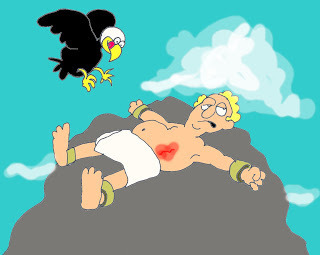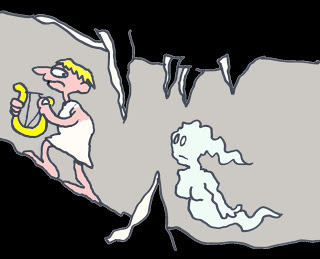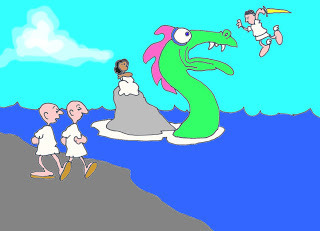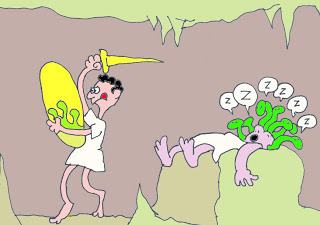Man Martin's Blog, page 209
January 30, 2012
Echidna January 30
 "And I understand everyone of them has a different father." Echidna was the daughter of Gaiea and Tartarus. Echidna was half-woman, half-snake, but compared to her offspring, she was Angelina Jolie. You've heard the phrase "The Mother of All…" as in "The Mother of All Battles," "The Mother of All Cheezy-Curls," well, Echidna was the Mother of All Monsters, and it wasn't just hyperbole. If you wanted to be a monster in a Greek myth you had to be one of Echidna's kids or otherwise get turned into a monster by an angry god. 1 The strange thing was how little family resemblance there was among her children – only two of them, the dragon that guarded the Golden Fleece, and Scylla, even remotely looked like snakes, and none of them were human. One was actually a pig. 2 Most of them didn't amount to much except as sword-fodder for one hero or another, but some of them made themselves useful: for example the eagle who tore out Prometheus' liver each morning at dawn. Steady work and free meals. Or Cerberus, the watch-dog of Hades – three times the barks with one-third the fleas.
"And I understand everyone of them has a different father." Echidna was the daughter of Gaiea and Tartarus. Echidna was half-woman, half-snake, but compared to her offspring, she was Angelina Jolie. You've heard the phrase "The Mother of All…" as in "The Mother of All Battles," "The Mother of All Cheezy-Curls," well, Echidna was the Mother of All Monsters, and it wasn't just hyperbole. If you wanted to be a monster in a Greek myth you had to be one of Echidna's kids or otherwise get turned into a monster by an angry god. 1 The strange thing was how little family resemblance there was among her children – only two of them, the dragon that guarded the Golden Fleece, and Scylla, even remotely looked like snakes, and none of them were human. One was actually a pig. 2 Most of them didn't amount to much except as sword-fodder for one hero or another, but some of them made themselves useful: for example the eagle who tore out Prometheus' liver each morning at dawn. Steady work and free meals. Or Cerberus, the watch-dog of Hades – three times the barks with one-third the fleas.1. Lucky, there were plenty of angry gods around, so it wasn't like a glass ceiling as far as getting to be a monsters.2. The myth calls her a "sow." I guess that's more dignified.
Published on January 30, 2012 02:19
January 29, 2012
Prometheus January 29
 "God, I hate Mondays."Prometheus and his brother Epimetheus 1 had the task of creating all life on earth for which purpose they were given a big bag of gifts to distribute to their creations. When you hear the word gifts, don't think SmartPhones or gift cards to Outback; these are metaphorical gifts. Epimetheus made a whole bunch of animals really quickly because animals are simple to make, whereas Prometheus, who was making humans, worked very, very slowly because the human body is so elegant and exquisitely crafted. 2 Anyway, by the time Prometheus was done, his brother had used up all the gifts on the animals. So Prometheus was like, "You gave the gift of regenerating severed claws to the snow crab – I was going to give that to the humans!" and "You gave all the Trichonympha microbes to the termites! Now how will my people be able to digest cellulose?" So Prometheus sneaks up to Mount Olympus and brings down fire to give to mankind, which is why we are the only creature who can make fire. This led to all sorts of other technological advances. 3 Zeus was way pissed and he said to Prometheus, "I'll let you off this time, but don't ever…" Well, Prometheus didn't listen to the rest off it, but he should have because Zeus really had a terrible temper. So Prometheus pulls one more trick on Zeus. Zeus decides he wants some sacrifices from the people – termites and horseshoe crabs he left alone – so Prometheus makes two piles of meat: one which is bloody and gory, but is actually porterhouse steaks and rib-roasts, and the other, which looks shiny and pretty, but is really the "beef by-products" you read about on dog food labels. Naturally Zeus chooses the pretty but unappetizing pile, so after that, the Greeks sacrificed only the parts of the animal no one wanted to eat anyway. 4 When Zeus discovered he'd been given chitterlings when he could have had filet mignon, he was so displeased, he caused Prometheus to be chained to a mountain where every morning an eagle would come and eat out his liver. Since Prometheus was immortal, the liver always grew back, and the next morning the eagle came and ate it again. Prometheus was finally freed by Hercules, but he never got into trouble with Zeus again. A few thousand years of having his guts eaten by a bird had taught him a lesson.
"God, I hate Mondays."Prometheus and his brother Epimetheus 1 had the task of creating all life on earth for which purpose they were given a big bag of gifts to distribute to their creations. When you hear the word gifts, don't think SmartPhones or gift cards to Outback; these are metaphorical gifts. Epimetheus made a whole bunch of animals really quickly because animals are simple to make, whereas Prometheus, who was making humans, worked very, very slowly because the human body is so elegant and exquisitely crafted. 2 Anyway, by the time Prometheus was done, his brother had used up all the gifts on the animals. So Prometheus was like, "You gave the gift of regenerating severed claws to the snow crab – I was going to give that to the humans!" and "You gave all the Trichonympha microbes to the termites! Now how will my people be able to digest cellulose?" So Prometheus sneaks up to Mount Olympus and brings down fire to give to mankind, which is why we are the only creature who can make fire. This led to all sorts of other technological advances. 3 Zeus was way pissed and he said to Prometheus, "I'll let you off this time, but don't ever…" Well, Prometheus didn't listen to the rest off it, but he should have because Zeus really had a terrible temper. So Prometheus pulls one more trick on Zeus. Zeus decides he wants some sacrifices from the people – termites and horseshoe crabs he left alone – so Prometheus makes two piles of meat: one which is bloody and gory, but is actually porterhouse steaks and rib-roasts, and the other, which looks shiny and pretty, but is really the "beef by-products" you read about on dog food labels. Naturally Zeus chooses the pretty but unappetizing pile, so after that, the Greeks sacrificed only the parts of the animal no one wanted to eat anyway. 4 When Zeus discovered he'd been given chitterlings when he could have had filet mignon, he was so displeased, he caused Prometheus to be chained to a mountain where every morning an eagle would come and eat out his liver. Since Prometheus was immortal, the liver always grew back, and the next morning the eagle came and ate it again. Prometheus was finally freed by Hercules, but he never got into trouble with Zeus again. A few thousand years of having his guts eaten by a bird had taught him a lesson.1. Don't you hate it when parents give their kids rhyming names? Like naming two boys Jimmy and Timmy. Why would you do that?2. It goes without saying this story was written by humans.3. Some eels can produce electricity, but they never learned to make iPods.4. They also sacrificed a lot of brussels sprouts and pickled beets.
Published on January 29, 2012 02:30
January 28, 2012
Medusa January 28
 Medusa was the eldest of the three gorgon sisters, having snakes for hair and a pair of leathery bats' wings on her back. 1 The myth says that anyone who looked at her would turn into stone, which begs the question: how would anybody know how she looked? Maybe she had snakes for hair, maybe not; maybe she had candy canes or red wigglers; none of the eye-witnesses were talking. We can see why the snakes were frightening but I'm not sure exactly what terror the wings held. Maybe if something's really ugly, the last thing you want is to have it flying around. Imagine a flying warthog. Anyway, there's a couple of myths about Medusa's origin: one is that her parents were a couple of sea-gods, Phorcys and Ceto, but the one I like is that she was once amazingly beautiful. 2 She outraged the goddess Athena by doing a horizontal tango with Poseidon outside the temple, so the goddess made her into a monster. After that, Medusa lived with her two sisters Stheno and Euryale, and never seemed to make trouble for anyone until Perseus came and killed her.
Medusa was the eldest of the three gorgon sisters, having snakes for hair and a pair of leathery bats' wings on her back. 1 The myth says that anyone who looked at her would turn into stone, which begs the question: how would anybody know how she looked? Maybe she had snakes for hair, maybe not; maybe she had candy canes or red wigglers; none of the eye-witnesses were talking. We can see why the snakes were frightening but I'm not sure exactly what terror the wings held. Maybe if something's really ugly, the last thing you want is to have it flying around. Imagine a flying warthog. Anyway, there's a couple of myths about Medusa's origin: one is that her parents were a couple of sea-gods, Phorcys and Ceto, but the one I like is that she was once amazingly beautiful. 2 She outraged the goddess Athena by doing a horizontal tango with Poseidon outside the temple, so the goddess made her into a monster. After that, Medusa lived with her two sisters Stheno and Euryale, and never seemed to make trouble for anyone until Perseus came and killed her.1. But she had a terrific personality.2. Stories where gorgeous people suffer make the rest of us feel better about ourselves.
Published on January 28, 2012 02:23
January 27, 2012
Orpheus January 27
 Orpheus: Take Li'l Wayne, roll him in Paul McCartney and John Lennon, dip him in Beethoven and Mozart, and sprinkle with Louis Armstrong: that was Orpheus, greatest musician who ever lived. They say when he played, the trees would bend down and rivers would stop to listen. 1 Orpheus was one of the original Argonauts, which is a pretty impressive thing for a musician to have on his resume, but his big claim to fame had to do with Eurydice, his lover. He and Eurydice were deliriously happy until she was bitten by a snake and died. 2 Distraught over her loss, he went into the underworld to retrieve her. He played so movingly, that big fat tears rolled down Persephone's face – Hades doesn't seem to have been a music lover – and agreed to send Eurydice back with Orpheus. On One Condition. There's always One Condition, isn't there? Just when you think you'll get your sweetheart back from the dead, here comes One Condition lurking into the room to lob a stinker. Orpheus' One Condition was he couldn't look back – Eurydice would follow him back to the land of the living, but he couldn't take a peak to check until they were safely out. A snap, right? Well, not for Orpheus. Great musician, but no willpower. Just as he was reaching daylight, he stole one quick glance. What he saw was this: Eurydice's back as she turned around to head back down because he'd blown it. So having lost his lover, not once, but twice, to death, Orpheus did the only thing he could do. He wrote a song about it. Orpheus came to a bad end in Thrace. Some Thracian groupies, learning he was single again, wanted him to party with them, but Orpheus just wanted to sing about Eurydice. "Quit singing about her!" they said. "We like your old stuff!" Finally they figured enough was enough, and they tore him to pieces. 3
Orpheus: Take Li'l Wayne, roll him in Paul McCartney and John Lennon, dip him in Beethoven and Mozart, and sprinkle with Louis Armstrong: that was Orpheus, greatest musician who ever lived. They say when he played, the trees would bend down and rivers would stop to listen. 1 Orpheus was one of the original Argonauts, which is a pretty impressive thing for a musician to have on his resume, but his big claim to fame had to do with Eurydice, his lover. He and Eurydice were deliriously happy until she was bitten by a snake and died. 2 Distraught over her loss, he went into the underworld to retrieve her. He played so movingly, that big fat tears rolled down Persephone's face – Hades doesn't seem to have been a music lover – and agreed to send Eurydice back with Orpheus. On One Condition. There's always One Condition, isn't there? Just when you think you'll get your sweetheart back from the dead, here comes One Condition lurking into the room to lob a stinker. Orpheus' One Condition was he couldn't look back – Eurydice would follow him back to the land of the living, but he couldn't take a peak to check until they were safely out. A snap, right? Well, not for Orpheus. Great musician, but no willpower. Just as he was reaching daylight, he stole one quick glance. What he saw was this: Eurydice's back as she turned around to head back down because he'd blown it. So having lost his lover, not once, but twice, to death, Orpheus did the only thing he could do. He wrote a song about it. Orpheus came to a bad end in Thrace. Some Thracian groupies, learning he was single again, wanted him to party with them, but Orpheus just wanted to sing about Eurydice. "Quit singing about her!" they said. "We like your old stuff!" Finally they figured enough was enough, and they tore him to pieces. 3 1. The river part is pretty impressive, but what else has a tree got to do?2. They always blame a snake, you notice that?3. Fans!
Published on January 27, 2012 03:28
January 26, 2012
Persephone and Demeter January 26
Persephone and Demeter
 "Can't we ever watch anything besides golf?" So anyhow, one day the goddess of Nature, Demeter (rhymes with trimeter) and her daughter Persephone (rhymes with telephony) are out walking around, and who should pop out of the ground, but Hades (rhymes with Slim Shady's). Hades grabs Persephone and takes her down to… well… Hades. The god and the place are sort of the same thing, like with Trump Towers. Demeter was pretty flummoxed, I can tell you. Zeus was pulling stunts like this all the time, so you would have expected it from Zeus, but Hades usually kept to himself, so this was something new. But Hades had an impulsive side people didn't know about. His motto was, "What the hell?" So Demeter starts grieving over her lost daughter, and nature begins to die: leaves fall from the trees, the birds stop singing, pigeons won't eat popcorn, the works. The other gods are pretty upset about this, because if everyone dies, it's like, who's going to worship us? So they sent down the messenger god Hermes (rhymes with Burmese) to get her back, which he did, only there was one small thing. While she was down there, Hades offered her something to eat. She was all like, "No, I'm full really," and he was like, "Just a little something. You're practically skin and bones." And she relented and ate six pomegranate seeds. 1 So for every seed she ate, she has to spend a month with Hades to be his wife, even though there wasn't any warning on the package or she didn't sign anything to that effect, and when she's gone, Demeter goes into mourning all over again, which is why the weather is so crummy in winter. 2
"Can't we ever watch anything besides golf?" So anyhow, one day the goddess of Nature, Demeter (rhymes with trimeter) and her daughter Persephone (rhymes with telephony) are out walking around, and who should pop out of the ground, but Hades (rhymes with Slim Shady's). Hades grabs Persephone and takes her down to… well… Hades. The god and the place are sort of the same thing, like with Trump Towers. Demeter was pretty flummoxed, I can tell you. Zeus was pulling stunts like this all the time, so you would have expected it from Zeus, but Hades usually kept to himself, so this was something new. But Hades had an impulsive side people didn't know about. His motto was, "What the hell?" So Demeter starts grieving over her lost daughter, and nature begins to die: leaves fall from the trees, the birds stop singing, pigeons won't eat popcorn, the works. The other gods are pretty upset about this, because if everyone dies, it's like, who's going to worship us? So they sent down the messenger god Hermes (rhymes with Burmese) to get her back, which he did, only there was one small thing. While she was down there, Hades offered her something to eat. She was all like, "No, I'm full really," and he was like, "Just a little something. You're practically skin and bones." And she relented and ate six pomegranate seeds. 1 So for every seed she ate, she has to spend a month with Hades to be his wife, even though there wasn't any warning on the package or she didn't sign anything to that effect, and when she's gone, Demeter goes into mourning all over again, which is why the weather is so crummy in winter. 2
1. In the old days it was only five. Someone added two months to the calendar.
2. We still don't have an explanation for August.

 "Can't we ever watch anything besides golf?" So anyhow, one day the goddess of Nature, Demeter (rhymes with trimeter) and her daughter Persephone (rhymes with telephony) are out walking around, and who should pop out of the ground, but Hades (rhymes with Slim Shady's). Hades grabs Persephone and takes her down to… well… Hades. The god and the place are sort of the same thing, like with Trump Towers. Demeter was pretty flummoxed, I can tell you. Zeus was pulling stunts like this all the time, so you would have expected it from Zeus, but Hades usually kept to himself, so this was something new. But Hades had an impulsive side people didn't know about. His motto was, "What the hell?" So Demeter starts grieving over her lost daughter, and nature begins to die: leaves fall from the trees, the birds stop singing, pigeons won't eat popcorn, the works. The other gods are pretty upset about this, because if everyone dies, it's like, who's going to worship us? So they sent down the messenger god Hermes (rhymes with Burmese) to get her back, which he did, only there was one small thing. While she was down there, Hades offered her something to eat. She was all like, "No, I'm full really," and he was like, "Just a little something. You're practically skin and bones." And she relented and ate six pomegranate seeds. 1 So for every seed she ate, she has to spend a month with Hades to be his wife, even though there wasn't any warning on the package or she didn't sign anything to that effect, and when she's gone, Demeter goes into mourning all over again, which is why the weather is so crummy in winter. 2
"Can't we ever watch anything besides golf?" So anyhow, one day the goddess of Nature, Demeter (rhymes with trimeter) and her daughter Persephone (rhymes with telephony) are out walking around, and who should pop out of the ground, but Hades (rhymes with Slim Shady's). Hades grabs Persephone and takes her down to… well… Hades. The god and the place are sort of the same thing, like with Trump Towers. Demeter was pretty flummoxed, I can tell you. Zeus was pulling stunts like this all the time, so you would have expected it from Zeus, but Hades usually kept to himself, so this was something new. But Hades had an impulsive side people didn't know about. His motto was, "What the hell?" So Demeter starts grieving over her lost daughter, and nature begins to die: leaves fall from the trees, the birds stop singing, pigeons won't eat popcorn, the works. The other gods are pretty upset about this, because if everyone dies, it's like, who's going to worship us? So they sent down the messenger god Hermes (rhymes with Burmese) to get her back, which he did, only there was one small thing. While she was down there, Hades offered her something to eat. She was all like, "No, I'm full really," and he was like, "Just a little something. You're practically skin and bones." And she relented and ate six pomegranate seeds. 1 So for every seed she ate, she has to spend a month with Hades to be his wife, even though there wasn't any warning on the package or she didn't sign anything to that effect, and when she's gone, Demeter goes into mourning all over again, which is why the weather is so crummy in winter. 21. In the old days it was only five. Someone added two months to the calendar.
2. We still don't have an explanation for August.
Published on January 26, 2012 02:39
January 25, 2012
Perseus, the Final Chapter January 25
 Perseus returns with Andromeda back to the island where King Polydectes was hoping to ravish Perseus' mother. (Remember that part?) Well, Perseus had been gone a pretty long stretch by now, but Danae had managed to put off ravishment, but just barely. It was a near thing, I can tell you; another week or two, and I couldn't have answered for the outcome. So Perseus whips out Medusa's head, which he fortunately had in his trusty sack, and turns Polydectes into stone. So finally Perseus returns to the kingdom of Argos where his grandfather, King Acrisis lived. Now another thing you need to recall – and if there's one thing you need to read mythology it's a good memory, that and nothing else better to do – is that Acrisis had dumped Perseus and his mother in the Mediterranean in the first place owing to a prophecy that Perseus would grow up and kill him. So Acrisis lights out, leaving the whole joint to Perseus to do as he likes. Well. Everything goes along ducky, until one day Perseus was playing a game of quoits which is pretty much like horseshoes, except instead of a horseshoe you use a quoit, and please don't ask me what a quoit is, because I don't know. Well, anyway, one of Perseus' throws goes wide, and there just happens to be an old stranger watching from the sidelines, and the quoit beans him on the head, and it kills him, and guess who the stranger turns out to be? That's right: Acrisis! Now I've never played quoits, but if it's anything like horseshoes, which my sources say it is, it would take a pretty hard and wild throw to bean a stranger on the sidelines, and even then, I don't think an ordinary horseshoe could kill you unless it still had the horse attached, but anyway that's what happened and I don't see any reason for us to doubt it if we've already swallowed the part about Medusa. These days, and I'm not saying he would have served time, Perseus would have at least been investigated for negligent quoit playing or homicide by accidental beaning or something, but in those days the Greeks could find you Innocent by Reason of Prophecy, and that would have been the end of it. And it is the end of it. The End.
Perseus returns with Andromeda back to the island where King Polydectes was hoping to ravish Perseus' mother. (Remember that part?) Well, Perseus had been gone a pretty long stretch by now, but Danae had managed to put off ravishment, but just barely. It was a near thing, I can tell you; another week or two, and I couldn't have answered for the outcome. So Perseus whips out Medusa's head, which he fortunately had in his trusty sack, and turns Polydectes into stone. So finally Perseus returns to the kingdom of Argos where his grandfather, King Acrisis lived. Now another thing you need to recall – and if there's one thing you need to read mythology it's a good memory, that and nothing else better to do – is that Acrisis had dumped Perseus and his mother in the Mediterranean in the first place owing to a prophecy that Perseus would grow up and kill him. So Acrisis lights out, leaving the whole joint to Perseus to do as he likes. Well. Everything goes along ducky, until one day Perseus was playing a game of quoits which is pretty much like horseshoes, except instead of a horseshoe you use a quoit, and please don't ask me what a quoit is, because I don't know. Well, anyway, one of Perseus' throws goes wide, and there just happens to be an old stranger watching from the sidelines, and the quoit beans him on the head, and it kills him, and guess who the stranger turns out to be? That's right: Acrisis! Now I've never played quoits, but if it's anything like horseshoes, which my sources say it is, it would take a pretty hard and wild throw to bean a stranger on the sidelines, and even then, I don't think an ordinary horseshoe could kill you unless it still had the horse attached, but anyway that's what happened and I don't see any reason for us to doubt it if we've already swallowed the part about Medusa. These days, and I'm not saying he would have served time, Perseus would have at least been investigated for negligent quoit playing or homicide by accidental beaning or something, but in those days the Greeks could find you Innocent by Reason of Prophecy, and that would have been the end of it. And it is the end of it. The End.
Published on January 25, 2012 02:15
January 24, 2012
Perseus Part Five, Andromeda January 24
 "Now there's something you don't see everyday."
When Perseus was on his way home with Medusa's head, he passed through Ethiopia, where he saw a beautiful woman chained to the rocks, about to be sacrificed. He really needed to get home to prevent his mother being ravished by King Polydectes, but Perseus probably figured even the slowest ravisher on the planet could have gotten around to it by now, so what was the rush. So he stopped and saved the princess whose name was Andromeda, as you probably guessed. Somewhere around here in the Ray Harryhausen movie is when Zeus bellows, "Release the Kraken!" Only there wasn't any Kraken, just an ordinary sea-monster, and it wasn't Zeus who did it, it was Poseidon. Poseidon was angry because Andromeda's mother Cassiopeia had insulted the Nereids. The Nereids were very sensitive about those things, and Poseidon was very solicitous of their feelings. It would have made more sense perhaps to sacrifice Cassiopeia but Poseidon wanted to teach her a lesson, and if you get sacrificed yourself you don't learn a lesson, you just get sacrificed. Anyway. Unfortunately, Andromeda already had a fiancé and this just happened to be their wedding day; the guy had shown up in a fancy rented toga and everything, and the caterers had already come in. Phineus, that was the fiancé's name, had been very understanding about calling off the wedding on account of human sacrifice, but seeing this complete stranger swoop in – literally "swoop," Perseus was wearing flying sandals – and kill the sea monster and carry of Andromeda was just too much. He started to make a fuss about it, but Perseus popped Medusa's head out of the bag and gave him a good look at it, which turned him into stone, fixing him pretty good.
"Now there's something you don't see everyday."
When Perseus was on his way home with Medusa's head, he passed through Ethiopia, where he saw a beautiful woman chained to the rocks, about to be sacrificed. He really needed to get home to prevent his mother being ravished by King Polydectes, but Perseus probably figured even the slowest ravisher on the planet could have gotten around to it by now, so what was the rush. So he stopped and saved the princess whose name was Andromeda, as you probably guessed. Somewhere around here in the Ray Harryhausen movie is when Zeus bellows, "Release the Kraken!" Only there wasn't any Kraken, just an ordinary sea-monster, and it wasn't Zeus who did it, it was Poseidon. Poseidon was angry because Andromeda's mother Cassiopeia had insulted the Nereids. The Nereids were very sensitive about those things, and Poseidon was very solicitous of their feelings. It would have made more sense perhaps to sacrifice Cassiopeia but Poseidon wanted to teach her a lesson, and if you get sacrificed yourself you don't learn a lesson, you just get sacrificed. Anyway. Unfortunately, Andromeda already had a fiancé and this just happened to be their wedding day; the guy had shown up in a fancy rented toga and everything, and the caterers had already come in. Phineus, that was the fiancé's name, had been very understanding about calling off the wedding on account of human sacrifice, but seeing this complete stranger swoop in – literally "swoop," Perseus was wearing flying sandals – and kill the sea monster and carry of Andromeda was just too much. He started to make a fuss about it, but Perseus popped Medusa's head out of the bag and gave him a good look at it, which turned him into stone, fixing him pretty good.
Published on January 24, 2012 02:55
January 23, 2012
Perseus Part 4, Medusa January 23
Perseus and Medusa
 Perseus Sneaking Up On MedusaSo Perseus flies up to the island of the Gorgons and enters the cave where Medusa was sleeping.1 He knew that looking straight at her would kill him, so he used the reflection in his polished shield to sneak up on her. Perseus sliced off Medusa's head and put it in the sack he'd been given to prevent accidentally looking at it. 2 Out of Medusa's blood grew the flying horse, Pegasus, which some people find improbable, but I think is a whole lot more likely than being able to sneak up on somebody while looking at their reflection in a polished shield. If you're looking at someone's reflection, you have to be facing the opposite way. If you think it's easy to do this while sneaking up on somebody, try it and let me know. Naturally, Medusa's two sisters were furious and gave chase, but Perseus put on his helmet of darkness and became invisible and so escaped, which begs the question, why didn't he just have the helmet on the whole time.
Perseus Sneaking Up On MedusaSo Perseus flies up to the island of the Gorgons and enters the cave where Medusa was sleeping.1 He knew that looking straight at her would kill him, so he used the reflection in his polished shield to sneak up on her. Perseus sliced off Medusa's head and put it in the sack he'd been given to prevent accidentally looking at it. 2 Out of Medusa's blood grew the flying horse, Pegasus, which some people find improbable, but I think is a whole lot more likely than being able to sneak up on somebody while looking at their reflection in a polished shield. If you're looking at someone's reflection, you have to be facing the opposite way. If you think it's easy to do this while sneaking up on somebody, try it and let me know. Naturally, Medusa's two sisters were furious and gave chase, but Perseus put on his helmet of darkness and became invisible and so escaped, which begs the question, why didn't he just have the helmet on the whole time.
1. The myth is not clear if this was at night. Maybe Gorgons just slept a lot. If your expression turned people into stone, you wouldn't get out much.2. He may have been dissappointed when he got the bag as a gift, but I bet he was sure grateful to have it now.

 Perseus Sneaking Up On MedusaSo Perseus flies up to the island of the Gorgons and enters the cave where Medusa was sleeping.1 He knew that looking straight at her would kill him, so he used the reflection in his polished shield to sneak up on her. Perseus sliced off Medusa's head and put it in the sack he'd been given to prevent accidentally looking at it. 2 Out of Medusa's blood grew the flying horse, Pegasus, which some people find improbable, but I think is a whole lot more likely than being able to sneak up on somebody while looking at their reflection in a polished shield. If you're looking at someone's reflection, you have to be facing the opposite way. If you think it's easy to do this while sneaking up on somebody, try it and let me know. Naturally, Medusa's two sisters were furious and gave chase, but Perseus put on his helmet of darkness and became invisible and so escaped, which begs the question, why didn't he just have the helmet on the whole time.
Perseus Sneaking Up On MedusaSo Perseus flies up to the island of the Gorgons and enters the cave where Medusa was sleeping.1 He knew that looking straight at her would kill him, so he used the reflection in his polished shield to sneak up on her. Perseus sliced off Medusa's head and put it in the sack he'd been given to prevent accidentally looking at it. 2 Out of Medusa's blood grew the flying horse, Pegasus, which some people find improbable, but I think is a whole lot more likely than being able to sneak up on somebody while looking at their reflection in a polished shield. If you're looking at someone's reflection, you have to be facing the opposite way. If you think it's easy to do this while sneaking up on somebody, try it and let me know. Naturally, Medusa's two sisters were furious and gave chase, but Perseus put on his helmet of darkness and became invisible and so escaped, which begs the question, why didn't he just have the helmet on the whole time.1. The myth is not clear if this was at night. Maybe Gorgons just slept a lot. If your expression turned people into stone, you wouldn't get out much.2. He may have been dissappointed when he got the bag as a gift, but I bet he was sure grateful to have it now.
Published on January 23, 2012 02:56
January 22, 2012
Perseus Part 3, January 22
Perseus
 "It turns out winged sandals aren't
"It turns out winged sandals aren't
as practical as you might think."So now that Perseus had the information from the Graeae, 1 he headed off for the Hesperides, which was at the end of the world. At the Hesperides, the gods gave him several gifts. From Zeus he got an adamantine sword, from Hermes a pair of winged sandles so he could fly, and from Hades a helmet that made him invisible, and Athena gave him a polished shield. Someone else gave him a sack. I wonder what Perseus' reaction was when he got the sack. "Hey! It's a … sack… No, it's great, really. I needed a sack. Hermes gave me the power of flight and you gave me a sack. Terrific. Thanks loads." Now with these gifts, he was ready to set off for the isle of the Gorgons. Remember, he'd set off on this adventure at the behest of evil King Polydectes who wanted to ravish Perseus' mother. If he wanted to get back before that happened, he'd really have to step on it. Fortunately, Polydectes turned out to be an extremely slow ravisher.
1. Or possibly Greaea or Graaeeaa. I can never keep the spelling straight.
 "It turns out winged sandals aren't
"It turns out winged sandals aren'tas practical as you might think."So now that Perseus had the information from the Graeae, 1 he headed off for the Hesperides, which was at the end of the world. At the Hesperides, the gods gave him several gifts. From Zeus he got an adamantine sword, from Hermes a pair of winged sandles so he could fly, and from Hades a helmet that made him invisible, and Athena gave him a polished shield. Someone else gave him a sack. I wonder what Perseus' reaction was when he got the sack. "Hey! It's a … sack… No, it's great, really. I needed a sack. Hermes gave me the power of flight and you gave me a sack. Terrific. Thanks loads." Now with these gifts, he was ready to set off for the isle of the Gorgons. Remember, he'd set off on this adventure at the behest of evil King Polydectes who wanted to ravish Perseus' mother. If he wanted to get back before that happened, he'd really have to step on it. Fortunately, Polydectes turned out to be an extremely slow ravisher.
1. Or possibly Greaea or Graaeeaa. I can never keep the spelling straight.
Published on January 22, 2012 02:21
January 21, 2012
Perseus Part 2, The Gray Sisters January 21
 Perseus, Part 2
Perseus, Part 2Having resolved to slay Medusa, Perseus' next step was to find out just where she was. Since anyone who looked at her turned into stone, this made tracking down eye-witnesses tricky. Also, he needed special weapons with which to kill her, because there aren't many weapons you can use without looking at someone. The weapons in question were in the Hesperides, which was not a place you could just ask directions to from a passing stranger. He was advised by Athena to ask directions from the Graeae; she could have told him how to get there herself, but she didn't. Graeae just means "gray," which was a good name for them because they were gray all over, but no one could explain why their parents had named them Dread, Horror, and Alarm. Why would you give a kid a name like that? They were three crones who lived on an island and shared a single eye and a single tooth and were also Medusa's sisters. 1 The Graeae were so old, they could not remember their own childhood, but they knew a lot of other stuff, like how to get to the Hesperides. Anyway, Perseus outsmarted them by stealing their eye. He wouldn't give it back until they gave him the information, which they did. Even though this was thousands of years before Jeresey Shore, you can't blame them for betraying their own sister to get back their eye. Without that, the only thing they'd have to fight over would be the tooth.
1. It wasn't a very attractive family.
Published on January 21, 2012 02:45



